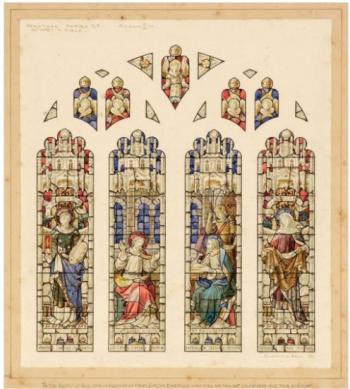Clayton & Bell
The partnership of John Richard Clayton (1827-1913) and Alfred Bell (1832-1895) was formed while they were both working in the practice of English Gothic revival architect, Gilbert Scott,(1811-1878). Clayton & Bell and Heaton & Butler shared premises (Heaton supplied the early kiln which was fired by railway sleepers, and it appears that Heaton & Butler also supplied a lot of knowledge and expertise. By 1861 Clayton & Bell had commenced manufacturing their own glass and moved into large premises in Regent Street, London, where they became one of the most prolific and proficient workshops of English stained glass during the latter half of the 19th century. By the 1860’s they were established in large premises in Regent Street with 300 employees. During the 1860’s and 1870’s night shifts were worked to fulfil a large number of commissions. The company was also producing decorative schemes and murals for churches. In the 1880's the two founders withdrew from active participation. The firm continued under Alfred Bell’s son, John Clement Bell (1860–1944), then under Reginald Otto Bell (1884–1950) and lastly Michael Farrar-Bell (1911–1993) until his death. Unfortunately, the records of Clayton & Bell were largely lost after enemy bombing in World War II. However, their windows can be found throughout the United Kingdom, the United States, Canada, Australia and New Zealand. The company moved out of London to Buckinghamshire after 1945.
Among their major commissions, is the cycle of great scholars produced for the Great Hall of the University of Sydney, designed by the colonial architect Edmund Blacket and based upon Westminster Hall in London. Other famous windows are the West Window of King's College Chapel, Cambridge, 1878, Probably the most significant commission was to design the mosaics for each side and beneath the canopy of the Albert Memorial. This towering monument set on the edge of Hyde Park in London commemorates Prince Albert, husband of Queen Victoria, who died in 1861. The firm of Clayton & Bell was awarded a Royal Warrant by the Queen in 1883.
Get Unlimited Access from just £5


